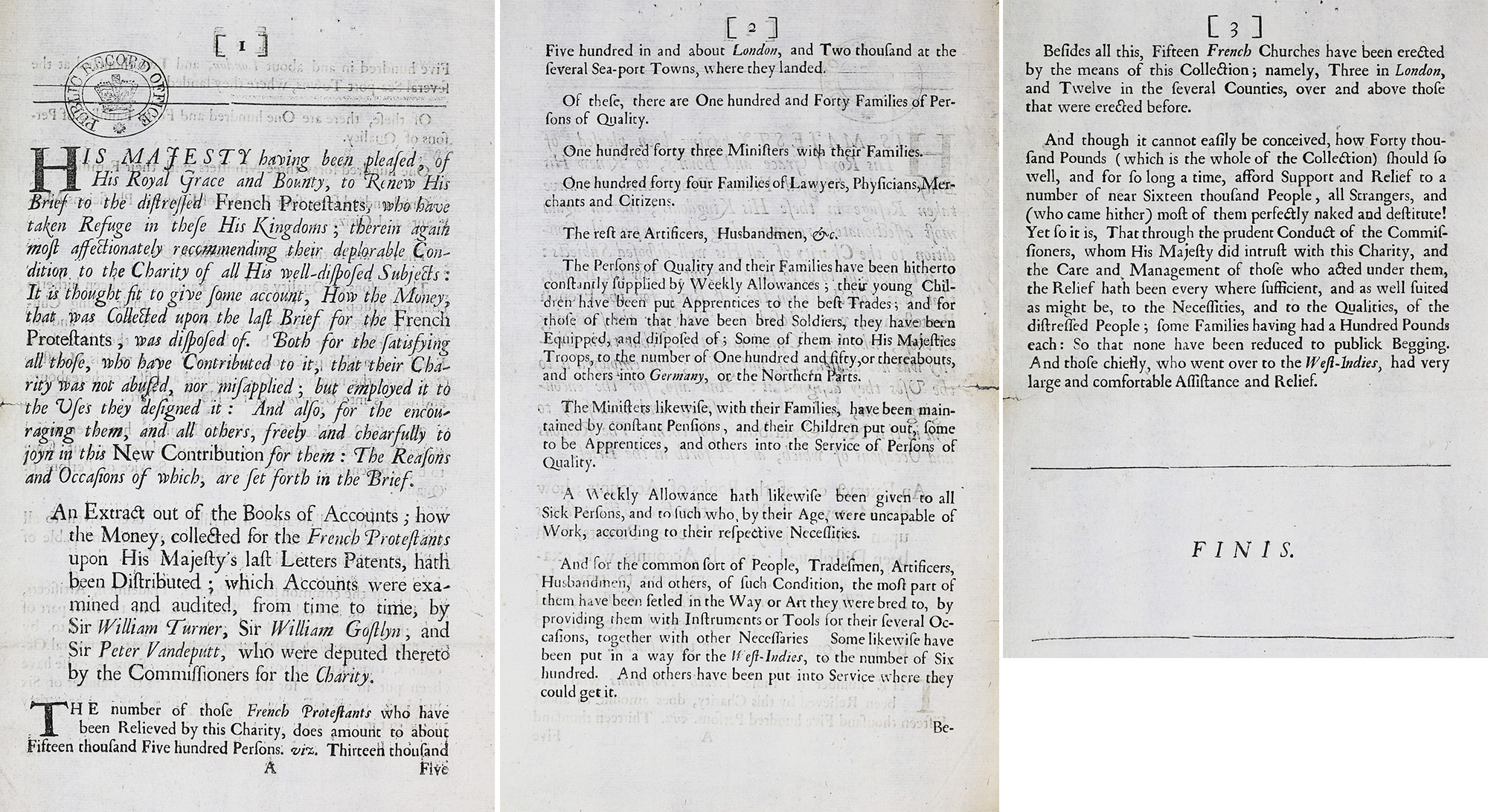
‘A printed tract, an audit of money contributed to a charity to relieve distressed French Protestants’. (c.1685-1688). Catalogue Ref. SP 32/11/203 f.347-8.
This printed tract from the reign of James II (1685-1688) provides a detailed account of how charitable donations from the English have helped Huguenot refugees.
Glossary
Glossary for starred words*. Other meanings given in square brackets.
- Commissioner: a person appointed to carry out a particular task as directed by the government.
- Artificers: an artisan or craftsman
- West Indies: Areas of North America and the Caribbean that were in the process of being colonised by the English, amongst other European countries, in the sixteenth-eighteenth centuries.
- Patent: a legal document conferring some privilege, right, protection etc.
Transcript
[p. 1]
His Majesty having been pleased, of His Royal Grace and Bounty, to Renew His Brief to the distressed French Protestants, who have taken Refuge in these His Kingdoms; therein again most affectionately recommending their deplorable Condition to the Charity of all His well-disposed Subjects: It is thought fit to give some account, How the Money, that was Collected upon the last Brief for the French Protestants, was disposed of. Both for the satisfying all those, who have Contributed to it, that their Charity was not abused, nor misapplied; but employed it to the Uses they designed it: And also, for the encouraging them, and all others, freely and cheerfully to ioyn [join] this New Contribution for them: The Reasons and Occasions of which, are set forth in the Brief.
An Extract out of the Book of Accounts; how the Money, collected for the French Protestants upon His Majesty’s last Letters Patents*, hath been Distributed; which Accounts were examined and audited, from time to time, by Sir William Turner, Sir William Gostlyn, and Sir Peter Vandeputt, who were deputed thereto by the Commissioners for the Charity.
The number of those French Protestants who have been Relieved by this Charity, does amount to about Fifteen thousand Five hundred Persons, viz. [namely] Thirteen thousand Five
[p.2]
hundred in and about London, and Two thousand at the several Sea-port Towns, where they landed.
Of these, there are One hundred and Forty Families of Persons of Quality.
One hundred forty-three Ministers with their Families.
One hundred forty-four Families of Lawyers, Physicians, Merchants and Citizens.
The rest are Artificers, Husbandmen, &c.
The Persons of Quality and their Families have been hitherto constantly supplied by Weekly Allowances; they young Children have been put Apprentices to the best Trades; and for those of them that have been bred Soldiers, they have been Equipped, and disposed of; Some of them into His Majesties Troops, to the number of One hundred and fifty, or thereabouts, and others into Germany, or the Northern Parts.
The Ministers likewise, with their Families, have been maintained by constant Pensions, and their Children put out, some to be Apprentices, and other into the Service of Persons of Quality.
A Weekly Allowance hath likewise been given to all Sick Persons, and to such who, by their Age, were uncapable of Work, according to their respective Necessities.
And for the common sort of People, Tradesmen, Artificers*, Husbandmen, and others, of such Condition, the most part of them have been settled in the Way or Art they were bred to, by providing them with instruments or Tools for their several Occasions, together with other Necessaries. Some likewise have been put in a way for the West-Indies*, to the number of Six hundred. And others have been put into Service where they could get it.
[p.3]
Besides all this, Fifteen French Churches have been erected by the means of this Collection; namely, Three in London, and Twelve in several Counties, over and above those that were erected before.
And though it cannot easily be conceived, how Forty thousand Pounds (which is the whole of the Collection) should so well, and for so long a time, afford Support and Relief to a number of near Sixteen thousand People, all Strangers, and (who came hither) most of them perfectly naked and destitute! Yet so it is, That through the prudent Conduct of the Commissioners*, whom His Majesty did instruct with this Charity, and the Care and Management of those who acted under them, the Relief hath been every where sufficient, and as well suited as might be, to the Necessities, and to the Qualities, of the distressed People; some Families having had a Hundred Pounds each: So that none have been reduced to publick [public] Begging. And those chiefly, who went over to the West-Indies, had very large and comfortable Assistance and Relief.
- How are (a) Huguenots (b) the Crown characterised in this document?
- Who is the intended audience for this document?
- The tract specifies that some Huguenots are destined for the ‘West-Indies’. What global geographical location is this referring to?
- What allowances have been made for Huguenots who are sick or unable to work?
- What elements of this source would be useful for a historian researching the demographic picture for Huguenots in London in the 1680s? [Consider: population number, trade or profession, geographical location, places of worship.]
- James II was hostile to Protestant refugees as a Catholic King, which the English public disliked. How does the source, however, characterise the attitude of the Crown and the Protestant refugees?
- How might this document work as a piece of royal propaganda?
